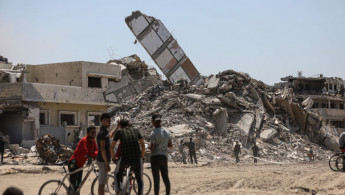Gaza rebuild estimated at over $80 billion, with future generations to face displacement
The cost of rebuilding Gaza after Israel's brutal assault on the enclave could be as high as $80 billion, according to experts.
RAND economist Daniel Egel told Bloomberg that the reconstruction could come to that amount when taking into account hidden costs, including labour market costs that have been impacted by death, injury and trauma.
According to the World Bank, from around October 2023 to January 2024, the estimated cost of reconstruction sat at $13.3 billion for housing, $553.5 million for health, and $502.7 million for water and sanitation, dwarfing statistics from the 2014 Israeli assault on the enclave.
These estimates do not account for Israel's invasion of Rafah which began in May, nor the damage sustained to other parts of the enclave since January.
The largescale reconstruction first demands the removal of 42 million tonnes of rubble that has been left in the wake of Israel's incessant bombardment of the enclave.
Gaza City, the largest and most damaged urban area, accounts of 15.4 million tonnes, while Deir el-Balah, the least damaged urban area accounts for 2.4 million tons.
The bill for that alone is estimated at $700 million, although if the territory can recycle around half of the rubble it can take around $143 million off the bill and recuperate a third of clean up costs, assessments suggest.
According to UN estimates, that would also be enough to rebuild Gaza's road network, which has been severely damaged by the Israeli onslught.
Clearing rubble, recovering bodies
The UN has proposed a four-phase plan to deal with rubble that includes preparation, initial clean up, clearing, and final disposal phases. Challenges that are predicted to arise include disposal of bombs and hazards like asbestos, as well as recovery of bodies.
Such a rubble clearance and rebuild effort would likely cause further displacement in the enclave that has seen near total destruction, according to Mark Jarzombek, an architectural history professor at The Massachusetts Institute of Technology.
Jarzombek told Bloomberg that construction sites must be cleared of people, which, compounded with length of time needed to rebuild the enclave, will see generations of Palestinians in Gaza dealing with this effort for years to come.
The UN has estimated that up to 15 years are needed to remove the rubble strewn across the Gaza Strip.
However, the political resolution and end of the war to enable reconstruction efforts to begin have yet to be agreed upon.
Israel and Hamas have not agreed on a ceasefire plan, with the Palestinians accusing Israel of using the talks as cover to prolong their assault.
Israel has also refused to agree on a political solution for the enclave, saying it will not allow the Palestinian Authority to control the territory after the war ends.
The Palestinian Authority is, alongside the UN, the main body that is planning the reconstruction efforts for the strip, as it has done in previous rounds of war.
Israel's war on Gaza has killed at least 40,139 people, injured a further 92,743 and damaged or destroyed much of the enclaves essential infrastructure.




 Follow the Middle East's top stories in English at The New Arab on Google News
Follow the Middle East's top stories in English at The New Arab on Google News


![A group of Palestinians, foreign and Israeli activists gather to participated in an olive picking event on the land in the town of Battir, which is under threat of confiscation by Israel in Bethlehem, occupied West Bank on 8 November 2024. [Getty]](/sites/default/files/styles/image_330x185/public/2182930803.jpeg?h=199d8c1f&itok=__0LgGsa)